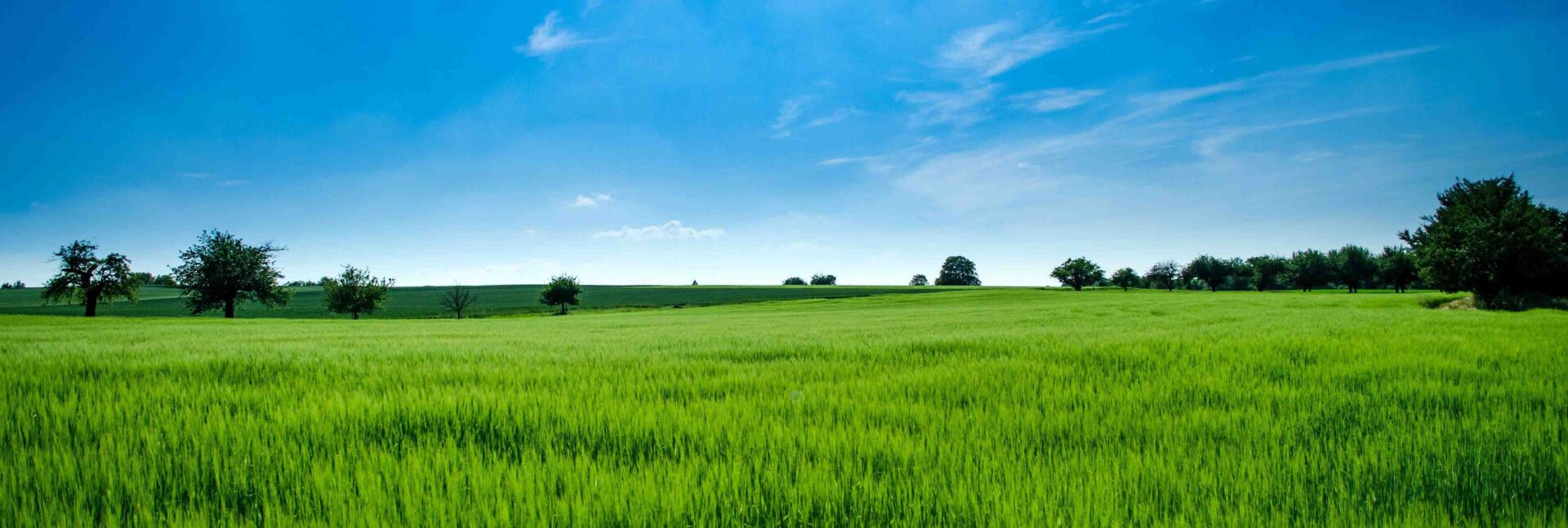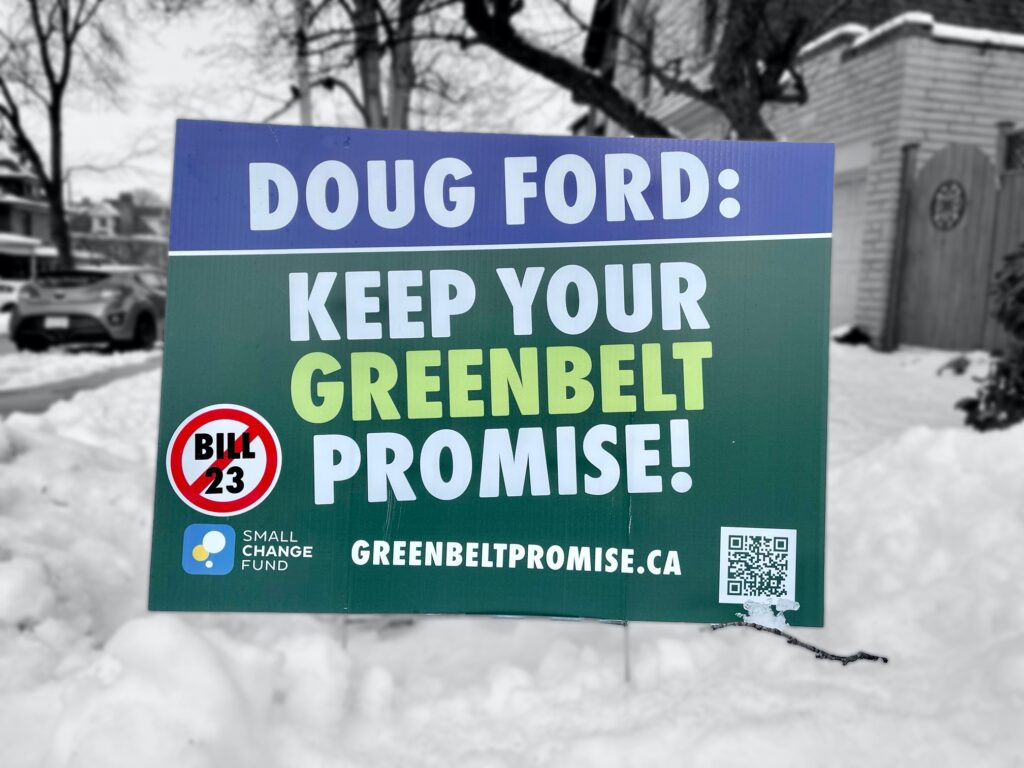Flip-flopping Ford

Doug Ford promised Ontarians that the Greenbelt was off-limits to developers – only to go back on his word. The abrupt policy shift has enraged much of the populace and as Ryan McGreal points out, Ford looks to have one heckuva fight on his hands.
On June 2, 2022, Doug Ford and the Ontario PC party won a majority of seats in the Ontario legislature with the support of just 18 per cent of eligible voters.
His party didn’t release a platform, his candidates strategically refused to participate in local riding debates, and he held almost no media engagements. Overall turnout was just 43.5 per cent, the lowest in Ontario’s history. The PCs received 40.8 per cent of the vote but won 67 per cent of the seats.
Ford benefited from widespread public exhaustion and burnout from the pandemic, combined with weak competition in a Liberal party weighed down by an unknown, uncharismatic leader, and a New Democratic Party that seemed more interested in fighting for second place than presenting a compelling case to lead the province.
Ford’s promise to Ontarians was to “get it done” – but he was assiduously vague about what “it” might be. I wonder if he would have won if voters knew he was planning to break his promise to protect the Ontario Greenbelt from development.
The Greenbelt is a vast area of environmentally sensitive farmlands, wetlands, grasslands, forests, watersheds and other greenspace in southern Ontario that was legally protected from development under the Greenbelt Act in 2005.
Ford has had a difficult relationship with the Greenbelt. In 2018, he publicly promised to protect the Greenbelt. Then video surfaced of Ford telling a private roomful of developers that his plan for “affordable housing” was to “open up … a big chunk” of the Greenbelt to let them build on it – and that it was developers who gave him the idea.
The backlash was instant and intense, and Ford quickly backtracked, insisting “the people have spoken” and that he would protect the Greenbelt after all. In 2020, he reiterated his promise not to touch the Greenbelt amid public outrage over changes to the law governing conservation areas that weakened their oversight powers.
During the 2022 campaign, to the extent that he spoke to the media at all, Ford repeatedly promised that he would not touch the Greenbelt. But last November, just five months after the election, he announced out of the blue that the Ontario government would strip 7,400 acres from the Greenbelt to allow new development – including 1,900 acres of protected lands in Hamilton.

This abrupt policy shift was not based on public sentiment. Indeed, the government’s own public consultations on the announcement found broad and consistent public opposition to removing Greenbelt protection.
But there was one demographic cheering the policy shift: the handful of property developers who are major donors to the PC party and who own most of the properties and would profit massively from their rezoning to allow development.
Investigative reporters soon discovered the property owners had been quietly buying it up over the past few years – the most recent purchase was just weeks before the announcement – raising questions about whether they knew the change was coming. When Municipal Affairs Minister Steve Clark was asked directly during Question Period if the developers were tipped off about the policy change, he flatly refused to answer.
Ford insists he needs to carve out the Greenbelt to provide more housing, but just this past February, his own government’s housing affordability task force concluded, “Most of the solution must come from densification” and the “Greenbelt and other environmentally sensitive areas must be protected.”
Both the Ontario integrity commissioner and the auditor general have opened investigations into the decision, while the OPP’s anti-rackets branch is reviewing whether to open an investigation.
The Ford government’s shameless Greenbelt flip-flop comes amid a furor over Bill 23, the More Homes Built Faster Act, which, in typical Ford fashion, drowns a sensible idea or two in a flood of shameless giveaways to politically connected developers.
First, the good stuff. Bill 23 requires municipalities to allow up to three units on a residential lot as-of-right without a zoning variance. This will make it easier to add accessory suites like garden or laneway housing or basement apartments, and recognizes that single-unit zoning is just inherently exclusive and wasteful of valuable land.
However, it also strips conservation authorities of the power to protect rivers and wetlands from harmful developments that raise the risk of flooding; slashes the development charges that pay for new municipal infrastructure, which forces cities to cover the balance from the existing tax base; and prohibits site plan controls that can make new developments more environmentally sustainable.
Compounding these disastrous policy changes, Ford also overturned Hamilton’s firm urban boundary policy, a huge victory for local democracy when Hamiltonians across the city overwhelmingly told council to protect Hamilton’s greenspace and focus on building up rather than out.
Instead, the province has ordered Hamilton to expand its urban boundary by a massive 5,400 acres, a decision that has already provoked multiple demonstrations and a request by Environmental Defence for a judicial review on the basis that it violates the province’s own planning and growth policies.
Once sensitive natural lands have been destroyed, they are gone forever. This series of policy changes is mindbogglingly short-sighted – a catastrophic abrogation of the provincial government’s sacred duty of care for our common heritage in order to supply easy profits for its donors.
Local organizations Environment Hamilton and Stop Sprawl HamOnt are teaming up to organize resistance. Contact them and ask what you can do to help.
Ryan McGreal is a web programmer, consultant, writer, editor and self-described troublemaker. He served as founder and editor of Raise the Hammer, an online magazine dedicated to sustainable urban revitalization in Hamilton. He is also a founding member of Hamilton Light Rail, a community group dedicated to bringing light rail transit to Hamilton. His personal website is Quandy Factory.









